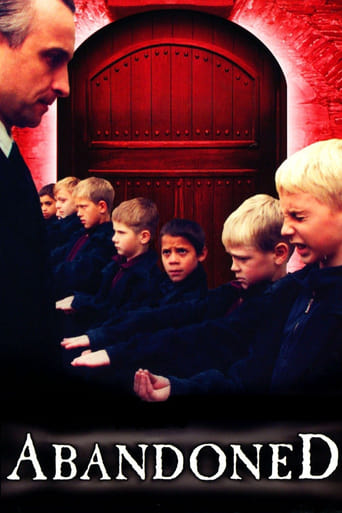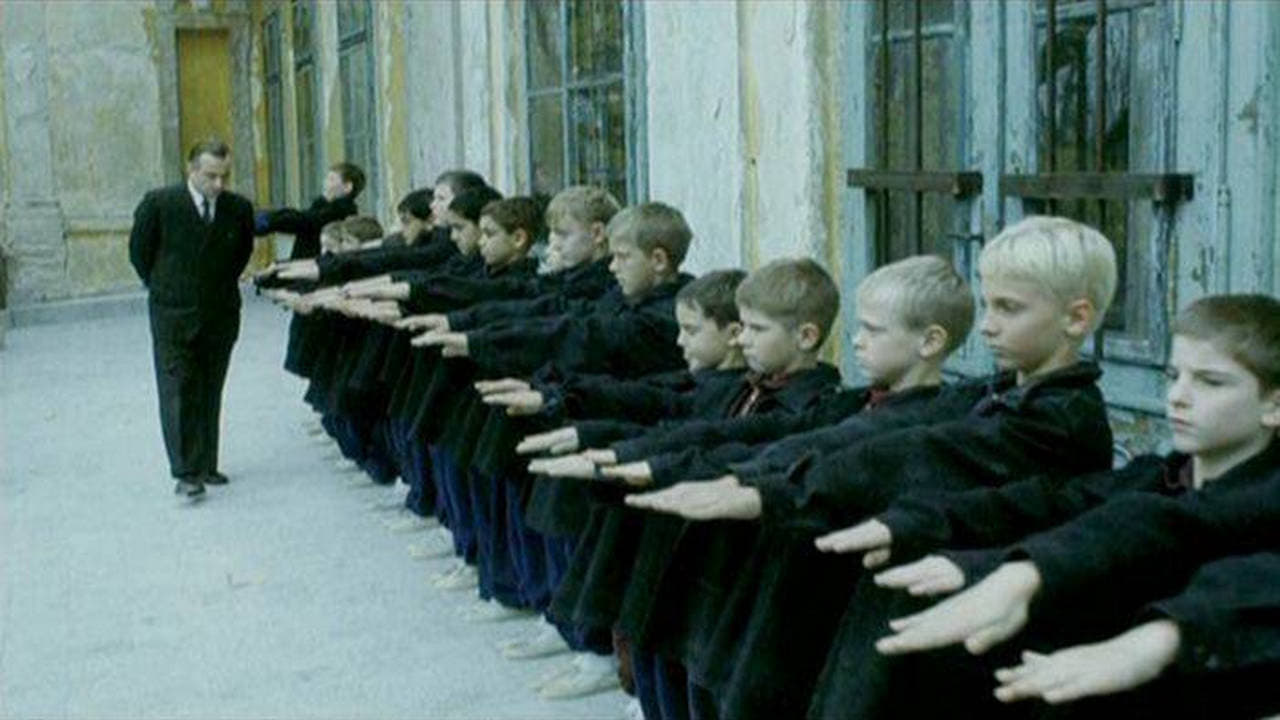gradyharp
'Torzók' ('Abandoned') is a brilliant Hungarian film written and directed by Árpád Sopsits that takes us back to Hungary of 1960 when the oppressive Communist rule altered the lives of everyone, especially children. The quality of the film is absolutely first rate from story to acting to filming to scoring. It may be a tough film to absorb and certainly not for the easily offended, but it is a perfectly honed gem of a film that deserves wide audience exposure.Áron (Tamás Mészáros) is a young lad whose life seems warm at first until suddenly a disease of vision impairment attacks his mother and his parents divorce: the mother is somewhere in a hospital and the father (Sándor Gáspár) beats the boy and eventually turns him over to a rigid orphanage for boys run by cruel taskmasters. Áron undergoes initiation tactics by his fellow orphans but despite the beatings he is strong enough to survive. He is befriended when he has his nightmares about his mother's blindness by his friend Atilla (Szabolcs Csizmadia) and the two bond emotionally and physically. In this bleak atmosphere a little light comes from the beautiful young housekeeper Anya (Krisztina Somogyi) but even her contributions are compromised by the cruelty of the staff. There is one 'teacher' in the orphanage school, Nyitrai (László Gálffi) who has been reduced to his position as an 'imprisoned one' by the government and his sadness is offset by his playing his cello and studying his beloved astronomy. Nyitrai offers Áron solace and introduces his 'fellow traveler' to the glory of the stars, giving Áron a map of the heavens that Áron cherishes - his window to a world beyond the dark confines of his prison-like orphanage. He gradually wins over his fellow orphans and when Nyitrai, in the pit of depression for his life situation and the cruelty of the orphanage and the government, hangs himself. This horrid incident drives Áron to organize an escape from the orphanage, an event that is ultimately fractured with a death for which Áron feels responsible. And the end of the film fades into the many possibilities that event could trigger.The atmosphere created by the stunning cinematography by Péter Szatmári defines the darkness that represents the orphanage well but also suggests the darkness in Hungary of that period. The musical score by Péter Fejcsik, Tamás Görgényi, Ferenc Toma, and Balázs Winkler is some of the most beautiful composed for the screen, making tremendously effective use of the cello and lower strings. In all, this is a brilliant piece of film-making, acted with depth in every role, and unveiling a portion of history and tragedy too often pushed to the background of our books. Highly Recommended. Grady Harp
jeanalmira
I watched this movie recently. It is about the orphanage live post anti-communist revolution in Hungary. The story shows the hard life inside the orphanage, with the over-strict and abusive teacher. A boy, named Aaron was brought into this place due to his mother poor health, and experienced the very suffer life that probably he had never even dare to imagine. Due to the very suffer life, the boys started to doubt whether the God was really exist. I personally feel touch with Mate determination to find God. His faith really moves me. But in this such hard life and despite all the suffer and abusive treatment, the boys found the most valuable friendship. Aaron and his friends decided to escape from the "hell". But too bad, it was heavy winter, and worse when one of his friend, Attila, died during the escape. And the rest were brought back to the orphanage. But I don't really like the ending, it is definitely not a happy ending. I give this movie 7/10 rating. Happy watching.
Carlos Martinez Escalona
Arpad Sopsits directs a monumental movie in Torzok. Not the Hollywood honey- smeared teddy-bear story. Here, with a masterful skill, he tells a story that, sadly, was and is frequent everywhere in the world.Abandoned by his hating father, Aron is thrown into a world of despair and violence. Endured stoically by the children in a communist-era orphanage, their plight is fundamentally surviving.The way the director-writer casts special spells on some of his characters, makes this film incredibly unnerving, disturbing. The ominous dread of injustice just around the corner, behind every door, at the lips of the traitors, is enough to keep the children in a tense and maddening situation.What makes this film so special is that Sopsits deals with the forbidden in a way that transcends beauty. The beauty of childhood. The beauty of innocence. Against the hatred and folly of the torturers. Religion and religious spirit play a central part in this play. The story unfolds with lots of different wings. Every one of them of different colours and hues. But all of them masterfully intertwined to let the story flow.This film can leave you shattered and shivering. Maybe sobbing in frustration and anger. But the nuances of love, moral spirit and unbreakable will in the children, are more than enough to praise this work as a very deep reflection on good and evil. As a key to try solving the innermost doubts we all have some time in our lives. And to centre our motivations in thoughts of hope, that are always the flames that kindle the human spirit, no matter the age.Since my view of most films is, first, as a cinematographer, I'd like to comment on it, too.The approach to this film is minimalist. Lighting is kept to its bare minimum, pushing film to all what it can give in available light situations. The scenes are lit and photographed in such a way, that effectively conveys the mood of the story.Almost complete darkness is used in some very disturbing scenes. There's no place for joyful moods, except in some of Aron's dreams, that are ethereal and surreal, but extremely powerful. The operation of the steadicam in some scenes is perfect. Everything fits in place to tell the story. And never wanders into worlds of glamour, flashiness, silky and smooth images. The director and his DoP did a job that is almost never seen in big productions. And, from my point of view, this kind of approach leads to realistic images and straightforward story telling.
The transfer on DVD is pristine. The sound is absolutely amazing, with a score that may be one of the most naturally haunting I've ever heard, relying mostly on cellos and upright bass. I think there should be a special prize for After Crying... the music is perfect.Winner of so many awards, this film has not been released in Britain and was not shown except in festivals.
Gordon-11
This is a Hungarian film about a child being abandoned by his father. The child was sent to an orphanage, where he and other children were treated cruelly by the orphanage master. The children could not tolerate such torture anymore, and decided to escape. Although, the escape was successful, one of the children fell into the river and died. Another child got a high fever. Therefore, they had to seek help. Back in the orphanage they were punished cruelly, and the children were made to bear the name of murderers.I think it would be good if the film would say something about why the children suddenly ended up back in the orphanage after their escape. Did they walk back? Were they caught by the police? Were they caught by the orphanage master? It didn't say in the film.When I watched this film, I felt very sad. I could not believe that children could be treated so badly. They had to whip each other as a form of punishment. If they show any mercy they will be punished too. In this environment of terror, I think it is very harmful to the development of the children. Without love and care, the children will grow up to become delinquents.And yet, I believe that there are many institution in the world that treats children like this. As many people would know, the orphan problem is very bad in Eastern Europe. There are many orphans living in orphanages, and even more orphans have to live on the streets or in the sewers. They are left alone by their parents, and even outcast by their society.
I feel very touched by this film. Indeed, many viewers of this film were touched, too, they felt very sorry for the children. Maybe this film can increase the awareness of the orphan problem in the world. When the awareness increase, then the children are more likely to receive a better treatment.


 AD
AD


